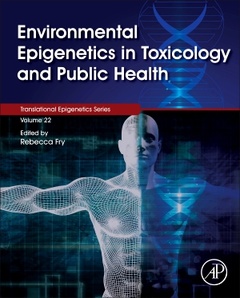Description
Environmental Epigenetics in Toxicology and Public Health
Translational Epigenetics Series
Coordinator: Fry Rebecca
Director of collection: O Tollefsbol Trygve
Language: English
Keywords
Adaptive immunity; Agouti viable yellow; Alcohol; Autoimmune; Biology; Biomarkers; Birth; Birthweight; Cancer; Chemokines; Child health; Chromatin; Chromatin remodeling; CpG methylation; Cytokines; Developmental origins of health and disease; Developmental programming; DNA methylation; DNA methylation age; Early-life gestational aging; Environmental contaminants; Environmental epigenetics; Environmental health; Environmental toxicants; Environmental toxins; Epigenetic aging; Epigenetic clock; Epigenetic epidemiology; Epigenetic gestational age; Epigenetic inheritance; Epigenetic mechanisms; Epigenetics; Epigenetics age; Epigenome; Epigenomics; High-throughput technologies; Histone modifications; Human development; In utero exposures; Infectious agents; Innate immunity; Inorganic exposures; Interleukins; Intrauterine growth restriction; Invertebrates; Ionizing radiation; KeywordIntergenerational; KeywordNutrition; Leukocytes; Lung disease; Maternal tobacco smoke; Microarrays; miRNAs; Model organisms; Neurodevelopment; Next-generation sequencing; Noncoding RNAs; Nonhuman primates; Organic exposures; Pharmacological exposures; Placenta; Plants; PPAR?; Pregnancy; Sequencing; Tobacco smoking; Toxicology; Transgenerational; Unicellular eukaryotes; Zebrafish
364 p. · 19x23.3 cm · Paperback
Description
/li>Contents
/li>Readership
/li>Biography
/li>Comment
/li>
Environmental Epigenetics in Toxicology and Public Health provides in-depth discussions of the suite of complex environmental factors shown to impact epigenetic components within the cell, as well as evidence that these epigenetic modifications are tied to early and later life health effects. This book offers a translational research perspective, highlighting both in vivo and human population-based evidence for ties between the environment, the epigenome, and health outcomes, with an emphasis on evidence for transgenerational effects of exposures, as well as developmental windows of susceptibility to environmentally-linked epigenetic effects.
This volume in the Translational Epigenetics series aides in the development of new therapeutic options meant to reverse inappropriate epigenetic alterations, helping researchers in their efforts prevent and treat a variety of chronic diseases tied to environmental exposures.
Section I. Epigenetic Mechanisms/Machinery 1. DNA methylation/chromatic regulation/non-coding RNAs 2. Tools for the assessment of epigenetic regulation
Section II. Transdisciplinary approaches for the study of environmental epigenetics 3. Model organisms and their application in environmental epigenetics 4. Epidemiological concepts in environmental epigenetics
Section III. Epigenetic programming of disease in relation to the environment 5. Pregnancy and Birth outcomes 6. Neurodevelopment outcomes 7. Cancer 8. Respiratory dysfunction 9. Immune dysfunction 10. Cardio/Metabolic disease 11. Aging
Section IV. Transgenerational epigenetic effects of the environment 12. Transgenerational effects of environmental contaminants
Section V. Epigenome-targeted therapies in environmental health science 13. Nutrition 14. Manipulation of Epigenetic machinery
Section VI. Conclusions and Future Perspectives 15. Conclusions and Future Perspectives: The environment and the epigenome
Human geneticists; human genomicists; translational researchers in genomic medicine, epigenetics, molecular biology, toxicology, public health, environmental science; life science researchers; oncologists; immunologists; bioengineers; developmental biologists
Dr. Tollefsbol is a Distinguished Professor of Biology and a Senior Scientist in the O’Neal Comprehensive Cancer Center, Integrative Center for Aging Research, Nutrition Obesity Research Center, University Wide Microbiome Center, and the Comprehensive Diabetes Center at the University of Alabama at Birmingham (UAB). He is Director of the UAB Cell Senescence Culture Facility which he established in 1999. Dr. Tollefsbol trained as a Postdoctoral Fellow and Assistant Research Professor with members of the National Academy of Science at Duke University and the University of North Carolina. He earned doctorates in molecular biology and osteopathic medicine from the University of North Texas Health Sciences Center and his bachelor’s degree in Biology from the University of Houston. He has received prior funding from the NCI, NHLBI, NIMH and other federal institutes as well as the Glenn Foundation for Medical Research, Susan G. Komen for the Cure, the American Federation for Aging Research (AFAR), and the American Institute fo
- Offers a thorough discussion of the environmental factors influencing epigenetic mechanisms in early and late life, and in transgenerational inheritance
- Examines both animal model and human population-based research in environmental epigenetics, highlighting developmental windows of vulnerability to epigenetic modification
- Features contributions from international experts in the field
These books may interest you

Epigenetics and Metabolomics 170.55 €

Epigenetics and Reproductive Health 170.55 €


